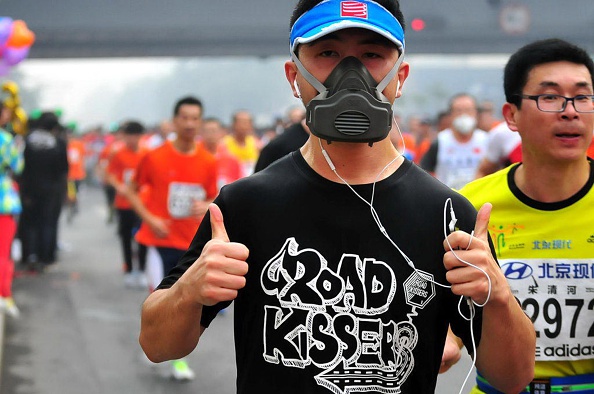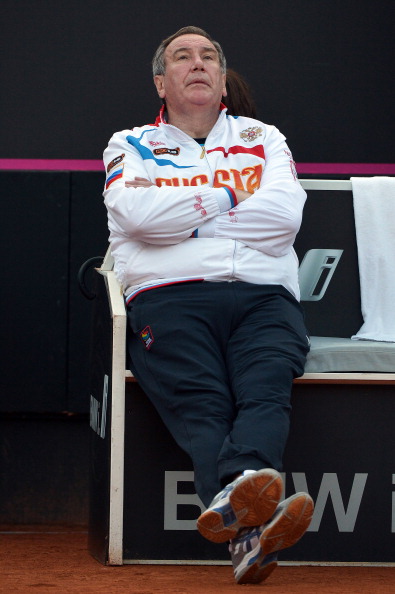Friendship, excellence and respect — these are the key values underpinning the mission of the International Olympic Committee, indeed the Olympic enterprise worldwide. Moreover, the IOC likes to say that athletes are at the center of everything everyone in the Olympic movement does. Two episodes over the weekend raise serious questions about whether both are true, or just so much lip service. And with the IOC’s policy-making executive board meeting later this week in Switzerland, the issue becomes what — if anything — the IOC is going to do about it.
The first:
Shamil Tarpischev, the head of the Russian tennis federation and an IOC member since 1994, got caught saying on a talk show that sisters Serena and Venus Williams were “brothers” and and “scary” to look at.
He denied any “malicious intent,” according to Associated Press and said his quotes had been taken out of context.
“The IOC will directly contact Mr. Tarpischev to ask him for a full explanation of his comments,” a spokesman said Monday in response to a request for comment.
The second:
Many runners at Sunday’s Beijing Marathon opted for particle-filtering surgical masks to cope with the oppressive smog blanketing the city. The smog was so bad the U.S. Embassy rated the air quality hazardous.
“Actually, on a normal day, nobody would run in such conditions," Liu Zhenyu, a runner and computer engineer, told Associated Press. “But the event is happening today, so what can we do?”
Even the People’s Daily China acknowledged conditions were bad.
Some of the runners have given up in the 2014 Beijing Marathon due to the serious air pollution in Beijing. pic.twitter.com/GoVpxcPcKH
— People's Daily,China (@PDChina) October 19, 2014
To be clear, the IOC itself had nothing to do with the Beijing Marathon.
But — Beijing and Almaty, Kazakhstan, are the only two cities in the world that are left in the race for the 2022 Winter Olympics.
So here are the choices:
Beijing, where the air is so bad — and this, six years after the 2008 Summer Games, amid promises then by the Chinese authorities that it was going to get better, instead of worse — that runners are wearing surgical masks to try to get through the running of a marathon?
Or Almaty, where remarks last week from the director of the ice rink in Astana proved unusually revealing. The Asian Winter Games in Kazakhstan in 2011 split time between Astana and Almaty; the 2022 plan, at least for now, is to focus solely on Almaty.
“We have to formulate our bid something like this: ‘The Olympic Games in Almaty — the cheapest, thriftiest, smartest Games,” said rink director Nail Nurov.
He went on to say, referring to the $51 billion figure associated with the 2014 Games, “What the Russians have done in Sochi is a serious problem,” because by spending so much, “they raised the bar to “unbelievable organizational heights.” The perceived “rule” that each edition of the Games must better the preceding one was, he said, probably why Oslo, Munich, Krakow, St. Moritz/Davos, Stockholm and Lviv had said no thanks to 2022.
Oh, and in 2013 voters in Austria said no to a 2028 Summer Games bid as well.
If you were writing a slogan, and at the risk of being perhaps overly glib, what would you have?
Beijing 2022: “Most Polluted Games Ever And No Mountains Remotely Close.”
Almaty 2022: “Cheapest Games Ever.”
To use an American saying: this is no way to run a railroad.
Three times in recent weeks, after Oslo dropped out, reducing the number of purportedly viable candidates from three to two, this space has urged the IOC to consider whether the 2022 campaign as it stands now is best practices, and to put the whole thing on pause for six months.
The IOC has said it is committed to its process.
In ordinary times, that would be a defensible position.
As this space has pointed out, however, this is an extraordinary situation, and extraordinary times call for an extraordinary re-think — and leadership.
Lest all this be seen as the promotion of a 2022 late-stage bid by the U.S. Olympic Committee from Denver and Salt Lake City — there is no signal that is in the works. The USOC is intent on 2024, if that still seems do-able after the IOC’s all-members vote on President Thomas Bach’s “Agenda 2020” review and potential reform plan in December.
What has to be asked, however, is why other cities aren’t even being given a chance to see if they might be interested. Is the IOC quietly doing due diligence? Shouldn’t it be?
To reiterate: the IOC has $880 million to give to the winning city, which would cover nearly half, if not more, of a prudent organizing committee’s operating costs.
When Oslo dropped out, the IOC said it intended “to communicate, to communicate, to communicate” about the advantages of bidding for the Games.
It has been nearly three weeks now.
There has been no such communication.
There has been an announcement that the IOC intends to meet with sports officials in Norway about what went wrong there.
Why meet with sports officials? If you want a debrief, fine. But in this context, what authority do such sports officials have? It was the government that pulled the plug. The politicians are the ones paying the bills. If you want to do something constructive, meet with the politicians, as awkward, weird, uncomfortable, whatever it might be.
Remember: the Lillehammer Youth Games are in 2016. Who’s paying for those?
As Bach said in September in South Korea at the Asian Games — and it is a profound mystery why more people have not picked up on this huge statement — sports and politics absolutely do mix.
Which leads, in its way, back to Tarpischev.
Tarpischev is close to Russian president Vladimir Putin. When Bach was elected IOC president, the very first call he — that is, Bach — took was from Putin.
So whatever is going to happen is going to be complex and layered.
Tarpischev, 66, has already been fined the maximum $25,000 and banned from the WTA Tour for a year.
According to RT.com, Tarpischev appeared Oct. 7 on a show called “Evening Urgant” — the host’s name is Ivan Urgant — with former WTA player Elena Dementieva.
This was part of the dialogue:
“I was at the Olympics and saw Maria Sharapova play her … him …," Urgant said.
“… One of the Williams brothers,” Tarpischev finished.
Can there be little question that his remarks were not only insensitive but also sexist and racist?
Serena Williams certainly thought so, adding, “I thought they were, in a way, bullying.”
Sharapova, who has played Fed Cup for Russia throughout her career, said of Tarpischev’s comments, “I think they were very disrespectful and uncalled-for, and I’m glad that many people have stood up, including the WTA. It was very inappropriate, especially in his position and all the responsibilities that he has not just in sport but being part of the Olympic committee. It was just really irresponsible on his side.”
Tarpischev said, according to RT.com, “I am sorry that the joke which was translated into English out of its context of a comedy show drew so much attention. I don’t think this situation is worth all the hoopla because those words were said without any malice.”
He also lamented, the website said, that the situation was “hyped to an absurd level,” adding that Russians do not file complaints when there are jokes elsewhere about “vodka, balalaika and bears.”
Friendship, excellence and respect is a long way away from vodka, balalaika and bears.
Tolerance and making the world even just a little bit better — this is what the International Olympic Committee, indeed the entire Olympic movement, piece by piece, day by day, person by person, is (supposed to be) about.
Whether or not Tarpischev intended to hurt anyone is not entirely relevant. In this case, the person whose feelings are at issue is Serena Williams. She is a big person and doesn’t need anyone to defend her in this sort of context but, honestly — four Olympic gold medals, three in doubles with her sister, and then of course the thrilling singles victory at Wimbledon in 2012?
Remember, the athletes are at the center of everything, right?
Tarpischev, whether he or Putin like it or not, has to be held to a higher standard. Too often the IOC is criticized for reaching for a utopia of sorts in which sport can not make a difference in showing the world how to get along. This incident offers a teachable moment.
To begin, the International Tennis Federation has been deadly silent on this issue. That is indefensible. The WTA has taken strong action. So should the ITF.
So, too, the IOC.
European soccer has been marked by ugly incidents of racism. Here is the perfect example for the IOC to demonstrate that words, even if meant in jest, which these arguably were not, can be just as hurtful as, say, throwing a banana on a soccer pitch.
In a world in which racism and sexism are regrettably yet virulent, the IOC can, and should, provisionally suspend Tarpischev.
You want the legal hook? He has brought the IOC into disrepute with his remarks. The IOC ethics commission can take it from there.
You want common sense? Everyone knows that hurtful words are the trigger for more.
And that saying something was just a joke is often just a lame way of covering up.
Again, extraordinary times call for extraordinary leadership. If the IOC means what it says, then there has to be more than just lip service.



